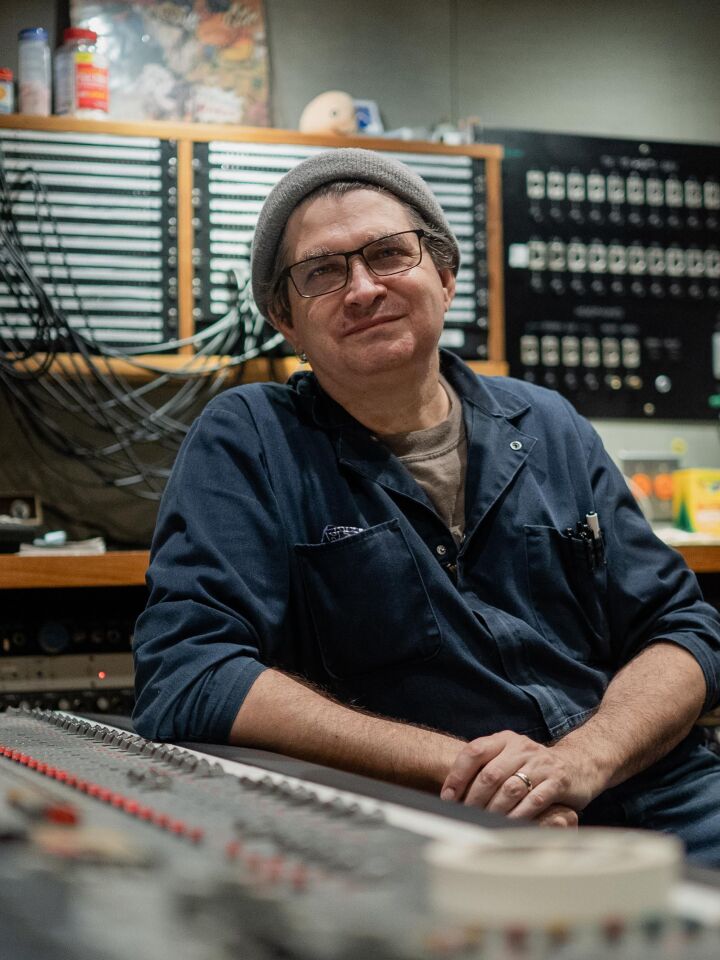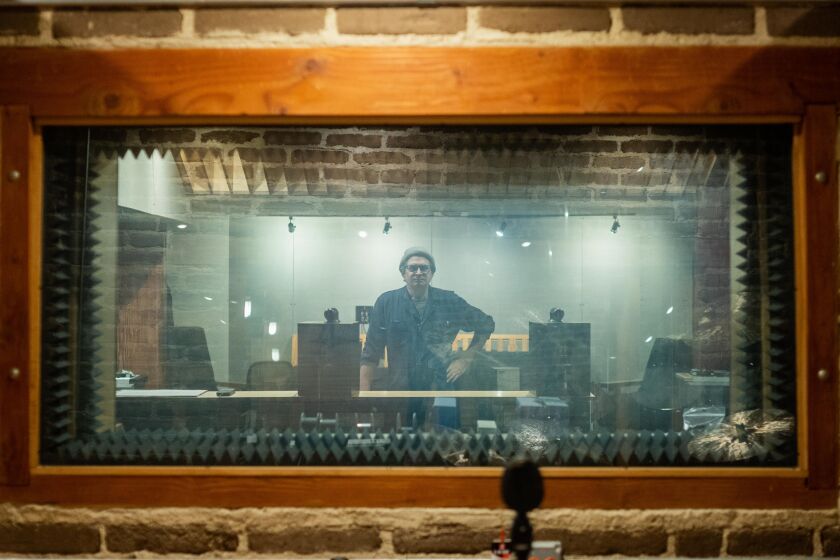Monday is Labor Day, an apt moment to consider a profession rarely featured in a daily newspaper.
“Let me show you the rest of the studio,” said Steve Albini, moving through a musician’s paradise of musical instruments — fine guitars, timpani, two grand pianos — plus an audiophile’s dream of equipment: Marshall amplifiers, reel-to-reel Ampex tape machines, high-end speakers, coiled cords, headphones, mixing boards, rows of phase shifters and fuzzboxes and other effect pedals. The walls are enormous bricks, each weighing 13 pounds.
“These are adobe bricks we had brought up from New Mexico,” he explains. “They have some interesting acoustic properties. The walls are self-isolating ... massive, enormously heavy and that stops the transmission of sound from room to room. We built this whole place. Everything you see is a new construction.”
Since 1997, here at Electrical Audio on Belmont Avenue, Albini has recorded music by thousands of musicians, from the world famous to the deeply obscure. Commercial clients, too. A few cases of Mamba fruity candy are scattered around the foyer — the manufacturer needed a recording studio to shoot a commercial, and hired the space, which has a feel that is somehow both cutting edge and classic.
“Everything that we’ve seen so far is Studio A — the bigger, fancier studio,” Albini said. “Each of the rooms has a different sound footprint, and that is intentional, so you can make an active choice about what you’re recording. That room over there is Alcatraz — super dead, super dry sound. This room is called the Kentucky room, much brighter and more lively recording environment. It has a quick slap of reverb and not a long-sustaining decay. Very good for drums. Any acoustic instruments, acoustic guitar, banjo violin, mandolin. Any percussion instruments, vibes and marimbas and all that kind of thing — all that sounds great in there because you get this quick, bright, reverberant sound from the room.”
If you’re wondering why we’re here, it’s complicated. Among the many bad things that COVID-19 has done is isolate people. Casual relationships vanish. It gets lonely. A few weeks back, I read a Tribune story about speed cameras that quoted Albini saying the typically challenging, contrarian things I remember him saying when we were in college together. Unlike drivers such as myself, merely irked to get speeding tickets, Albini finds the automatic speed cameras “a nicely implemented, mild reminder to keep speed under control in those areas.” Besides, he said, better to trust automatic cameras than give discretion to cops, who have proved “they will abuse that discretion.”
I miss Steve, I thought, which was odd, because I hadn’t seen him in nearly 40 years, when we were at Northwestern.
“This room has a much longer decay,” he said, continuing his tour. “It’s called Centerfield, and this is where we’ve done quite a few sessions where there is a whole ensemble playing together like a jazz band, where they’ve got a piano player, drummer, string bass, some horns or whatever. Everybody will congregate in this room. It’s a very traditional method of recording that this room is very suited to.”
We talked technology. I’d never pretend to even a tiny fraction of his knowledge, but come to the subject from a historical perspective. Those Ampex tape machines, for instance, spurred me to mention how Ampex demonstrated the first videotape recording device in Chicago in 1956.
“Ampex was one of the foundational entities in the audio world,” he replied. “The name is from founder Alexander Poniatoff: his initials, A.M.P., and ‘ex’ for excellence. He re-engineered captured German Telefunken tape machines after World War II and started making them in America. Americanized Nazi tape machines under the name ‘Ampex’ certainly became the world standard.”
I’ve toured Shure, the microphone manufacturer based in Niles, and told Steve what an impressive place it is, with their two archivists and acoustic dead rooms and big bottles of artificial sweat, used to test the ability of microphones to stand up under real-world performance conditions.
“It’s an interesting company,” he agreed. “Family-owned since the beginning. They made phonograph cartridges that were really well-respected. When phonograph fell out of favor, they stopped making them. But because they were a closely-held company, they still had all their tooling and all their data and everything about their old phonograph cartridges, so when vinyl made a resurgence they were able to revive their product line and get back in the game very smoothly — the sort of transition a lot of bigger companies couldn’t do.”
LP records now sell more than CD discs, in case you hadn’t heard. Albini mentioned that Shure sometimes gives him microphones to test, and I wondered what that is like from their point of view.
“Shure has done many projects at Electrical over the years, not only testing of prototypes,” said John Born, associate director of product management at Shure. “We’ve done launch events, video shoots, recordings and more. We keep going back because Steve and the team there are wonderful to work with and the facility is incredible.”
What about the debate between analog and digital recording?
“On a base level, all music is analog,” Albini began. “The sound going through the air moves the microphone diaphragm. That’s an analog of the air pressure. That makes an electric current which is an analog of the movement of the diaphragm. Then that gets recorded. Our studio was built during the end of the analog era and the beginning of the digital era, so it’s a hybrid studio. So there’s digital and analog stuff running simultaneously. Most of the freelance engineers or outside engineers who come here are almost all exclusively digital. A small number use analog as a special effect or whiff of exotica” — typography doesn’t permit me to express the note of contempt in his voice. “All of my sessions are analog.”
Later I circled back and asked: Why?
“Analog masters are good for 100 years or so, minimum, (we don’t really know because the earliest analog masters pre-WWII are still playable) while digital masters are beholden to a bunch of proprietary software and hardware, and often become unusable in a few years’ time....” he emailed. “And there’s an important quality to analog recording, that the boundaries of the media are soft, making it more forgiving than digital recording. ... In digital recording, if you exceed the headroom of the system you get unusable hash from a violently clipped signal. In an analog system in the same situation you only have some mild artifacts and plenty of leeway. You have to f--- up really badly to ruin an analog recording.”
It’s a practical preference.
“I work in the analog domain, but not for reasons of stubbornness, sound ‘magic,’ nostalgia or any other romantic notion,” he continued. “I consider my job to be making the historical record of our musical culture, and analog recordings are the most robust, durable and universal way to ensure that the music survives — potentially long enough for the music to find an audience, but as part of the historical record, if not. People are entrusting me with their lives’ work and I take that responsibility seriously. I want the music to survive.”
Speaking of survival, it was time for lunch — which, I hope you’ll indulge me, will be featured Wednesday, as we have not yet, in my view, gotten to the most interesting part of our conversation.







